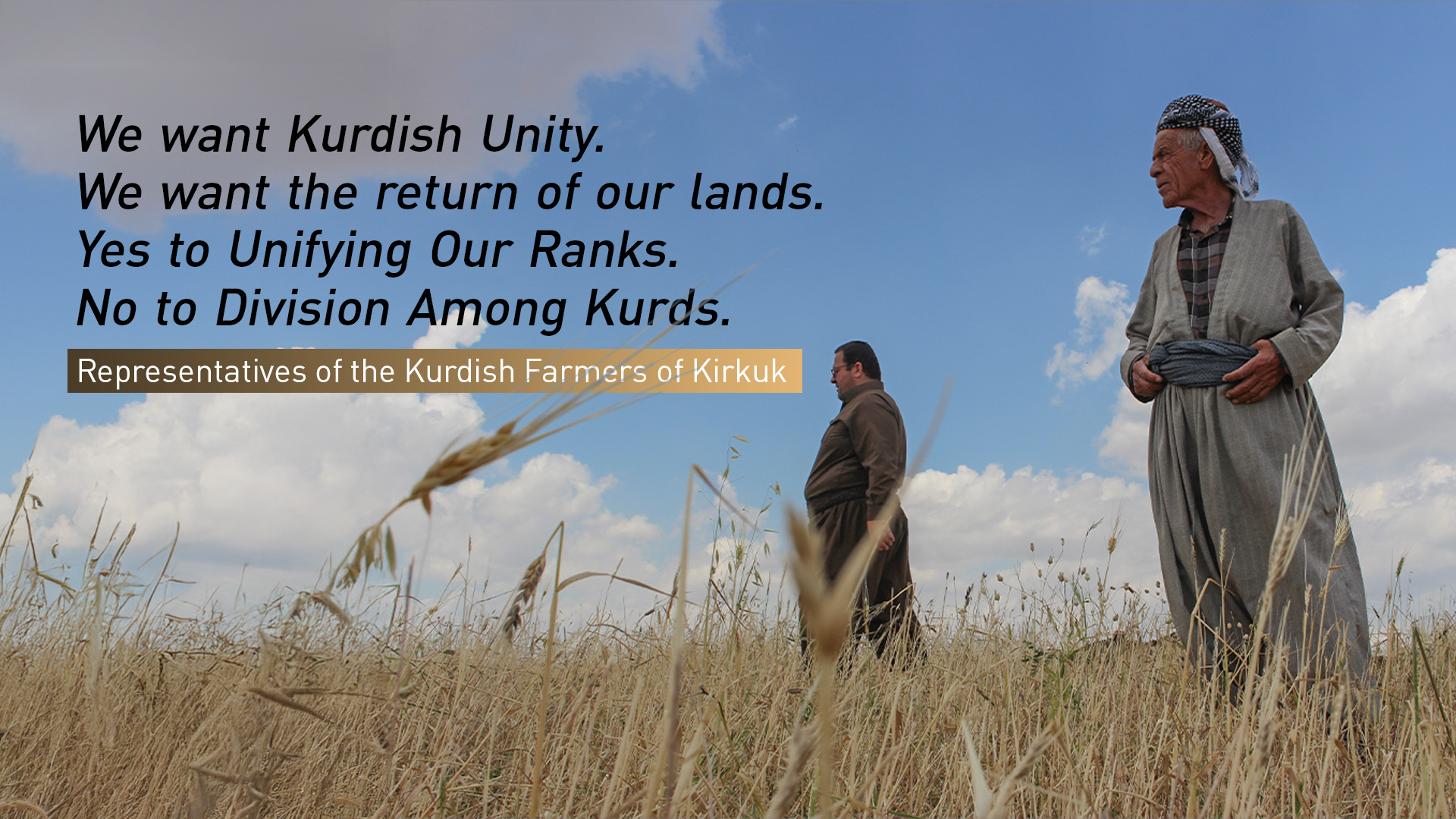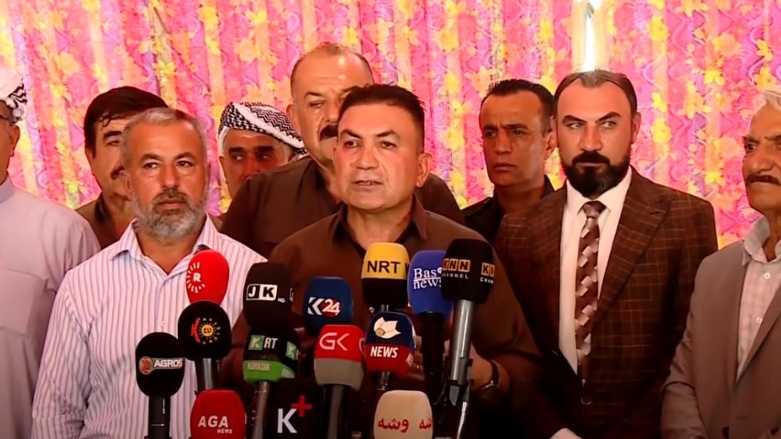Kirkuk Farmers Urge Unified Kurdish Front to Defend Lands and Rights
Kirkuk's Kurdish farmers issue a powerful plea for political unity to combat systematic land seizures and Arabization, as on-the-ground tensions and legal harassment, rooted in Ba'ath-era policies, continue to escalate in the disputed territories.

ERBIL (Kurdistan24) – In a direct and impassioned plea to the region's political leadership, representatives of Kirkuk's Kurdish farmers have issued a public statement decrying internal political divisions, which they argue are exacerbating the suffering of their community and undermining the fight to reclaim ancestral lands amidst a systematic campaign of dispossession. Speaking with what they described as "sincerity and pain," the farmers implored all Kurdish political parties and forces to set aside their disagreements and form a united front to address the "difficult circumstances" and "accumulated problems" facing the Kurdish population in the contested province.
The statement, a powerful articulation of grassroots frustration, asserts that Kirkuk "can no longer endure more disunity" and paints a grim picture of the reality on the ground. "Thousands of Kurdish farmers are still deprived of their agricultural lands, which were seized decades ago, and they continue to knock on doors to no avail," the representatives declared.
This public appeal for unity comes as a direct response to a mounting wave of pressure, a pattern starkly illustrated by recent events where farmers face not only land seizure attempts by settlers but also legal intimidation in the form of arrest warrants, all under the shadow of defunct Ba'ath-era laws.
The farmers' message is unequivocal: "We reject partisan disputes being used as a tool to divide the Kurdish house. Any disunity among you weakens us in the eyes of other communities, and every disagreement further squanders our rights."
The call to action from the farmers’ representatives details a broad spectrum of grievances that extend beyond the fields and into the very fabric of community life.
They highlight that Kurdish-inhabited villages often lack fundamental services such as drinking water, adequate electricity, and paved roads. Within the city of Kirkuk itself, the statement points to widespread suffering from unemployment, a lack of fair hiring opportunities, and a pervasive sense of "ever-increasing marginalization."
In light of this multifaceted crisis, the farmers insist on the urgent need for a "united and strong Kurdish leadership that will defend our rights and restore the people's trust."
Their demands are clear and concise, reflecting what they term the "unequivocal" voice of the Kurdish street: "We want Kurdish unity. We want the return of our lands. We want basic services. We want a single, unified voice within the Kurdish house that represents the Kurds of Kirkuk in all their diversity."

This desperate plea for political cohesion is deeply rooted in the escalating on-the-ground conflicts over land ownership, particularly in districts like Khurmatu.
As previously reported by Kurdistan24, the village of Tapa Sawz has recently become a flashpoint for a renewed and systematic campaign of Arabization. There, Kurdish farmers are defiantly resisting attempts by settlers, often backed by state security forces, to seize their agricultural properties using contracts issued during Saddam Hussein's Ba'ath regime.
In a tense standoff just days ago, Arab settlers, supported by the Iraqi army, attempted to occupy 1,800 donums of farmland belonging to local Kurdish families, presenting the Ba'ath-era documents as legal justification. The collective refusal of the Kurdish farmers successfully thwarted the immediate occupation, but the battle has since shifted to the courts.
In a move seen as legal coercion, arrest warrants were issued for four Kurdish landowners from Tapa Sawz, with the court demanding they surrender, sign a pledge, and ultimately relinquish their lands. This follows a similar incident last month where 24 other farmers from the same village faced arrest warrants before being released on bails of five million Iraqi dinars each.
One of the recently targeted farmers, speaking to Kurdistan24, expressed an unwavering resolve that captures the spirit of the resistance. "I will not go before the court in any way, nor will I sign any pledge. We will not give up the land of our forefathers," he stated, appealing directly to Kurdish officials to intervene and prevent the Arabization of their village.
Ahmed Jumaa, the representative of the Tapa Sawz farmers, provided crucial historical context to Kurdistan24, explaining the deep-seated nature of the dispute. "These contracts we have are like title deeds, but they are not being honored now. The imported Arabs have occupied our lands," Jumaa said, recounting a painful history of displacement. "We were displaced in 1987 under the pretext of being saboteurs, and our villages were destroyed."
He noted that the Arab settlers have held contracts on the 1,800 donums since 1990. While a period of relative calm existed between 2003 and 2014, the situation deteriorated sharply after the events of October 2017. "Since 2014, they evacuated the area because most of them were ISIS," Jumaa claimed. "However, after October 16th, they are increasingly going to court and filing complaints."
Jumaa also alleged that the settlers' actions are bolstered by local political support and that the renewal of some of the old contracts was illegal, as it failed to meet legal requirements such as prior cultivation and testimony from neighbors.
Critically, he revealed that the farmers possess a letter from the Iraqi Ministry of Agriculture which designates the area as falling under Article 140 of the Constitution. The letter stipulates that no contracts should be renewed until a parliamentary decision is made and that land ownership should revert to its pre-Ba'athist status. This highlights a profound disconnect between federal policy and the actions of local security forces and settlers who continue to enforce a bygone legal order.
The events in Tapa Sawz are emblematic of a persistent pattern of pressure against Kurdish landowners across Kirkuk and other Kurdistani territories outside the Kurdistan Regional Government's (KRG) administration.
This systematic campaign manifests in various forms of harassment. For instance, as reported by Kurdistan24, a Kirkuk court in July 2025 sentenced Ibrahim Tobzawayi, a Kurdish farmer, to a six-month suspended prison term after the Iraqi army filed a complaint against him for the act of building a house on his own ancestral land.
Tobzawayi described the ruling as a direct implementation of "Baath-era decisions."
Furthermore, in May 2025, military units were reported to be actively preventing Kurdish farmers in Kirkuk from working their land and harvesting crops, even for farms included in the Iraqi government's wheat subsidy program.
Despite the intense pressure, this period has also been marked by powerful displays of resilience and significant legal victories. In a landmark case in May 2025, a court in Kirkuk's Dibis District ruled in favor of three Kurdish farmers from Shenagha village, affirming their ownership of land claimed by Arab settlers.
That victory was preceded by a tense standoff in February 2025, where an Iraqi soldier was filmed trying to drag a farmer from his tractor. The farmer’s defiant cry, “Even if I die, I will not get down from the tractor!” became a potent symbol of Kurdish resistance, circulated widely by Kurdistan24, whose extensive coverage of the incident led to a temporary reporting ban by the Iraqi army.
The plight of the farmers has drawn strong condemnation from the highest levels of Kurdistan Region leadership. Following the events in Shenagha, President Masoud Barzani issued a statement warning that the scenes of harassment "remind us of the Anfal, chemical attacks, and genocide committed against our people."
Prime Minister Masrour Barzani has also been a vocal advocate, stating during a March 2025 visit with Peshmerga and farmers in Kirkuk that these regions are "not disputed; they are occupied and separated territories." He has consistently reaffirmed the KRG's commitment to defending farmers' rights through constitutional means, with his office and the Kurdistan Region Presidency condemning the Iraqi army's actions as unconstitutional and a threat to coexistence.
This long and painful struggle is a direct legacy of the systematic Arabization policies of Saddam Hussein's regime, which forcibly displaced hundreds of thousands of Kurds and other minorities to resettle Arab tribes in their place. Article 140 of the 2005 Iraqi Constitution was specifically designed to reverse these demographic changes through normalization, a census, and a referendum.
However, its implementation has been perpetually stalled, leaving land ownership in a legal limbo that is continuously exploited. While the Iraqi Parliament recently passed a law aimed at annulling Ba'ath-era land confiscation decisions, the reality in Kirkuk demonstrates that legislation from Baghdad often fails to penetrate the complex dynamics on the ground.
As the farmers of Kirkuk issue their call for political solidarity, their final words serve as both a plea and a vision: "Let us stand together—the people and all parties—far from narrow partisan and personal interests, for a bright and just future for our people."
Their statement, "Yes to unifying our ranks... No to division within the Kurdish house," resonates with the steadfast resolve articulated by their counterparts on the front lines of the land struggle. It is a resolve echoed by Tapa Sawz representative Ahmed Jumaa, who stressed to Kurdistan24, "We will not give up a single inch of our lands."
Their combined voices underscore an enduring fight to reclaim history, protect heritage, and secure a future against the tide of historical injustice, a fight they now insist cannot be won without a unified Kurdish leadership.
